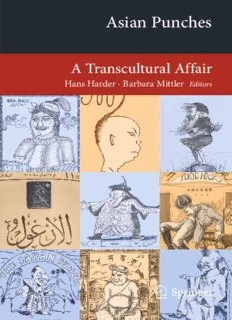
Asian Punches: A Transcultural Affair PDF
Preview Asian Punches: A Transcultural Affair
Asian Punches A Transcultural Affair Hans Harder · Barbara Mittler Editors 123 Transcultural Research – Heidelberg Studies on Asia and Europe in a Global Context SeriesEditors MadeleineHerren AxelMichaels RudolfG.Wagner For furthervolumes: http://www.springer.com/series/8753 . Hans Harder (cid:129) Barbara Mittler Editors Asian Punches A Transcultural Affair Editors HansHarder BarbaraMittler DepartmentofModernSouthAsian InstituteofChineseStudies LanguagesandLiteratures HeidelbergUniversity SouthAsiaInstitute Heidelberg,Germany HeidelbergUniversity Heidelberg,Germany ISSN2191-656X ISSN2191-6578(electronic) ISBN978-3-642-28606-3 ISBN978-3-642-28607-0(eBook) DOI10.1007/978-3-642-28607-0 SpringerHeidelbergNewYorkDordrechtLondon LibraryofCongressControlNumber:2013939976 #Springer-VerlagBerlinHeidelberg2013 Thisworkissubjecttocopyright.AllrightsarereservedbythePublisher,whetherthewholeorpart of the material is concerned, specifically the rights of translation, reprinting, reuse of illustrations, recitation,broadcasting,reproductiononmicrofilmsorinanyotherphysicalway,andtransmissionor informationstorageandretrieval,electronicadaptation,computersoftware,orbysimilarordissimilar methodologynowknownorhereafterdeveloped.Exemptedfromthislegalreservationarebriefexcerpts inconnectionwithreviewsorscholarlyanalysisormaterialsuppliedspecificallyforthepurposeofbeing enteredandexecutedonacomputersystem,forexclusiveusebythepurchaserofthework.Duplication ofthispublicationorpartsthereofispermittedonlyundertheprovisionsoftheCopyrightLawofthe Publisher’s location, in its current version, and permission for use must always be obtained from Springer.PermissionsforusemaybeobtainedthroughRightsLinkattheCopyrightClearanceCenter. ViolationsareliabletoprosecutionundertherespectiveCopyrightLaw. The use of general descriptive names, registered names, trademarks, service marks, etc. in this publicationdoesnotimply,evenintheabsenceofaspecificstatement,thatsuchnamesareexempt fromtherelevantprotectivelawsandregulationsandthereforefreeforgeneraluse. While the advice and information in this book are believed to be true and accurate at the date of publication,neithertheauthorsnortheeditorsnorthepublishercanacceptanylegalresponsibilityfor anyerrorsoromissionsthatmaybemade.Thepublishermakesnowarranty,expressorimplied,with respecttothematerialcontainedherein. Printedonacid-freepaper SpringerispartofSpringerScience+BusinessMedia(www.springer.com) We shall always play PUNCH, for we consider it best to be merry and wise— “And laugh at all things,forwewishtoknow,What,afterall,areall thingsbutashow!”—Byron. “The Moral of Punch,” inaugural editorial, Punch, 17July1841. . Preface This book is the outcome of a conference on the transcultural aspects of Punch magazine, held in November 2009 at Heidelberg University. The event was con- venedbyaresearchgroupcalled‘GaugingCulturalAsymmetries:AsianSatireand theSearchforIdentityintheEraofColonialismandImperialism’,workingunder theauspicesoftheHeidelbergClusterofExcellence‘AsiaandEuropeinaGlobal Context:ShiftingAsymmetriesinCulturalFlows’.AsianPunchesattemptstobring togetherforthe firsttime research on late-nineteenth-andearly-twentieth-century versions of the Punch, and similar satirical journals from various parts of Asia (including Cairo, which is, of course, North Africa, and Istanbul on the border between Asia and Europe). Many satirical periodicals of the time were directly inspiredbytheBritishPunchmagazineandoftenevenadoptedthenamePunch.It is hoped that this overview of Ottoman, Egyptian, South Asian, Chinese and Japanese Punch versions and other Punch-inspired satirical periodicals will add a newdimensiontoresearchonPunch,and‘Victorian’satiricaljournalismgenerally. We also hope to show the necessity of adopting a transcultural perspective when dealingwithsuchphenomena,aswellasmakingsomeheadwaytowardsproviding cluesforwhatsuchaperspectivemightentail. Assembling materials from a number of different Asian languages, this book usestheirrespectiveconventionsforthetranscriptionofterms,quotedpassagesor bibliographicreferences.ThetransliterationofOttomanTurkishisbasedprimarily on that found in the Redhouse dictionaries: James W. Redhouse, A Turkish and EnglishLexicon,andRedhouseYeniTu€rkc¸e-IngilizceSo€zlu€k.1ForArabic,translit- erationisrestrictedtotheindicationoflongvowels,hamzaandʿayn.FortheSouth Asian languages, conventional diacritics are used, with some additions suggested 1JamesW.Redhouse,RedhouseYeniTu€rkc¸e-I˙ngilizceSo€zlu€k(Istanbul:RedhousePress,1986); JamesW.Redhouse,ATurkishandEnglishLexicon(Istanbul:C¸ag˘r{Yay{nlar{,2001). vii viii Preface by Rahul Peter Das.2 Chinese is rendered into Latin script in accordance with the HanyuPinyinsystemandJapaneseistranscribedintoRo¯maji. Wearegrateful,firstofall,totheClusteranditssponsor,theGermanResearch Foundation, for funding this project. We would like to thank all contributors for sharingourenthusiasmforthisendeavourbywritingandrewritingchaptersforthis book. Some of them agreed at very short notice to compose additional chapters: Ritu Khanduri, who rewrote an article on Indian versions of Punch for us, and MarilynBooth,whocontributedanadditionalarticleonTheCairoPunch. Lastbutnotleast,wewouldalsoliketothankthosewithoutwhosehelpitwould hardly have been possible to put this book together: Verena V€ockel, who did an excellent job organising the conference; Jessica Fischer for very prompt copy- editing;EmilyMaeGrafandAnneMoßnerforproducingthetypescript,thelatter especiallyforcoordinatingunifiedtransliterationsandassemblingtheimages;Judit A´rokayforhersupportwiththeJapanesetitles;ElianeEttmuellerforthetransliter- ationoftheArabiccitationinMarilynBooth’sfirstchapter;NasirAbbasNayyarfor hishelp withthe transliterationofseveral Urdutitles, Richard Littler forgraphics restoration of the illustrations; and Andrea Hacker for supervising the publication onbehalfoftheClusterofExcellenceandSpringer-Verlag. HansHarder BarbaraMittler 2SeeRahulPeterDas,“ReviewofDusˇanZbavitel,BengaliLiterature(Wiesbaden:Harrassowitz, 1976),” Indo-Iranian Journal 27 (1984): 51–69; 66, n. 2. In the following chapters, there are, however, a few deviations from this system. For example, the vocalic -r- is written as r, the (cid:1) retroflex -r- as ṛ, and -b- as the last part of a Bengali conjunction is written as -v- wherever Sanskrit-derivedwordsareconcerned. Contents Prologue:LateNineteenthandTwentiethCenturyAsianPunchVersions andRelatedSatiricalJournals. . . . . . . . . . . . . . . . . . . . . . . . . . . . . . . . 1 HansHarder Part I Punch,theTemplate ThePresenceofPunchintheNineteenthCentury. . . . . . . . . . . . . . . . . 15 BrianMaidment Part II PunchinSouthAsia PunchandIndianCartoons:TheReceptionofaTransnational Phenomenon. . . .. . . . . . . . . . . . . . . . . .. . . . . . . . . . . . . . . . . . .. . . . . 47 ParthaMitter ThePossibilityofSatire:ReadingPratapNarainMisra’sBra¯hman, ˙ 1883–1890. . . . .. . . .. . . .. . . .. . . . .. . . .. . . .. . . .. . . . .. . . .. . . .. 65 AlokRai FromPunchtoMat0va¯la¯:TransculturalLivesofaLiteraryFormat. . . 75 PrabhatKumar ThePunchTraditioninLateNineteenthCenturyBengal: FromPulcinellatoBasantakandPa¯˜cu. . . . . . . .. . . . . . . .. . . . . . . .. . 111 ChaitiBasu CrossingBoundaries:PunchandtheMarathiWeeklyHinduPan˜ca (1870–1909). . . . . . . . . . . . . . . . . . . . . . . . . . . . . . . . . . . . . . . . . . . . . . 151 SwaraliParanjape ix
Description: